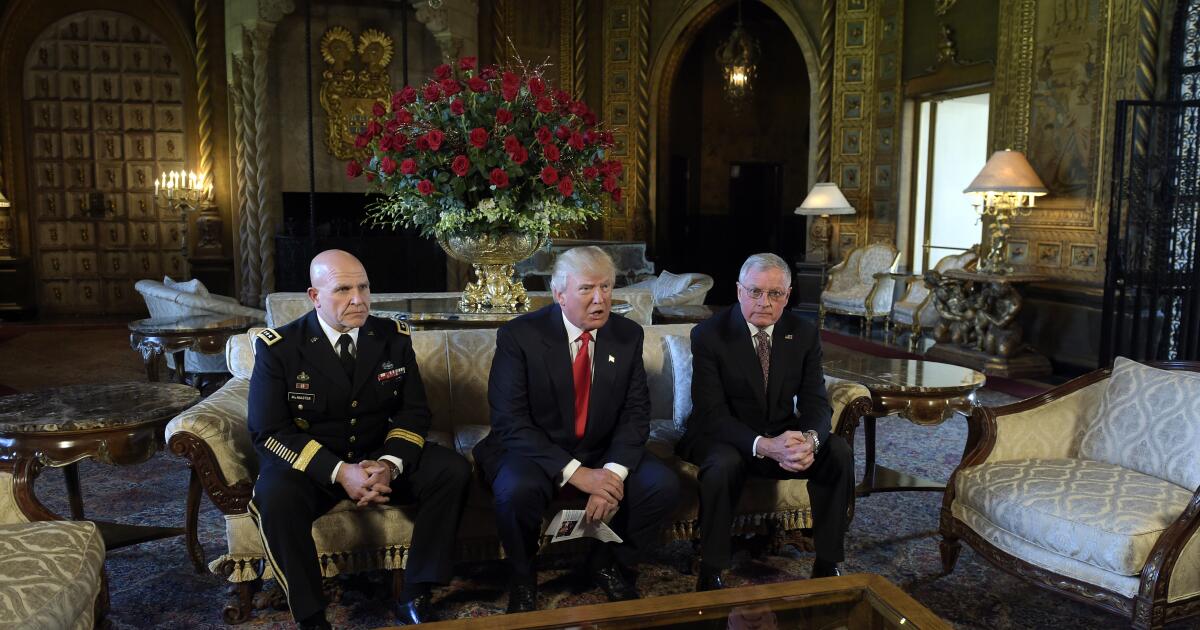A favorite word Democrats use to argue against a second Trump presidency is “guardrails.” The argument goes something like this:
Donald Trump didn’t know what he was doing the first time around, and there were people who protected the republic against his worst instincts. He’s now experienced, and he won’t have the same kinds of White House staffers and structure to rein him in during a second term.
This talk has flared up in the wake of former national security advisor H.R. McMaster’s book, “At War with Ourselves: My Tour of Duty in the Trump White House,” in which he describes Trump’s Oval Office decision-making as chaotic, sycophantic and lacking in nuance.
McMaster writes that Trump often pitted staff members against one another and said “outlandish” things in meetings, such as suggesting we bomb Mexican drug cartel facilities. (That idea doesn’t sound too bad to me, even if McMaster found it distasteful.)
Of course, the guardrails argument is often made in a vacuum, and in Trump’s case it lacks comparison with what’s been transpiring with the current occupant of the Oval Office, President Biden, and his vice president, Kamala Harris. I’m not very sympathetic when Trump’s guardrails are questioned and the Biden administration’s aren’t.
Biden and Harris have made their fair share of poor decisions, endured crippling staff turnover and have been known to lash out in R-rated language when advisors and staff displease them, no doubt quelling some good, even necessary advice.
“No one is safe,” an administration official told Axios, from Biden’’s F-bomb-laden admonitions. And the father of an intern in Harris’ office when she was California’s attorney general said her staff was “in complete fear” of being profanely berated. His son, he wrote in an op-ed in the Union newspaper, which covers California’s Nevada County, was told only senior staff members could address her directly.
As a former White House staffer, I do believe in the important responsibility advisors have in helping the president arrive at solid decisions. But make no mistake — the buck stops with the president. And sometimes presidents overrule or ignore their advisors because it is their prerogative to abide by or ignore staff guardrails pretty much at will.
Ultimately, it’s the president the people want — and the Constitution demands — making the big decisions.
Both sides have warts to cure on their judgment.
For Harris, it’s the chaos of the Afghanistan withdrawal. Inflationary policies. Pressuring social media platforms to “censor” content, in Mark Zuckerberg’s words. Executive actions fought by the courts. And her role in masking the president’s suitability for a second term.
For Trump, his actions on Jan. 6 were a low point in a presidency that otherwise most Republicans found more than palatable. He cut taxes, appointed conservative judges and kept the nation safe. And his retrospective job approval in recent polls topped 50%.
Democrats are making an audacious ask of Republicans right now, which is to lay down every conservative value they have on the theory that a Trump term without “guardrails” is a danger to the country. But a lot of Republicans would tell you that any fears they have about Trump’s decision-making structure are dwarfed by the specter of a Harris presidency jerking the country hard to the left, and in ways that might be unrecoverable.
My faith is in the system. Biden/Harris and Trump have both been held up by the Supreme Court. The House of Representatives stifled both administrations at times, and as long as the filibuster stands in the Senate — not a sure thing if the Democrats retain control without the moderating but departing influences of Kirsten Sinema and Joe Manchin II — it is the strongest check against hyper-partisan radicalism.
And there’s this: The voters have a chance to reward or punish policy decisions made by the president and his party every two years. And if things get too out of hand, Congress can jettison or severely restrain a wayward president anytime it sees fit.
Scott Jennings is a contributing writer to Opinion, a former special assistant to President George W. Bush and a senior CNN political commentator. @ScottJenningsKY







